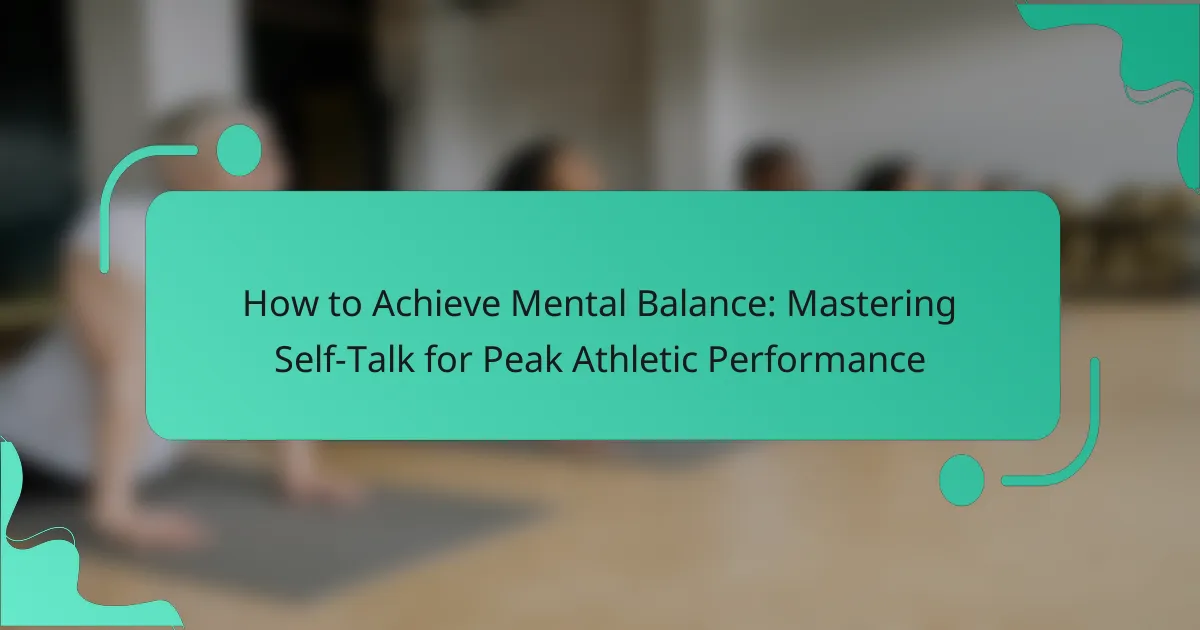Achieving mental balance is crucial for peak athletic performance. This article explores the impact of self-talk on focus, confidence, and anxiety reduction. It outlines techniques like visualization, affirmations, and mindfulness to enhance self-talk. Additionally, it addresses common pitfalls such as negative self-talk and unrealistic expectations that can hinder performance.

What is Self-Talk and Why Does it Matter for Athletes?
Self-talk is the internal dialogue athletes use to influence their performance and mindset. It matters because positive self-talk enhances focus, boosts confidence, and reduces anxiety, allowing athletes to perform at their peak. Research shows that athletes who engage in constructive self-talk can improve their performance metrics by up to 20%. By mastering self-talk, athletes can cultivate a mental balance that supports their training and competition goals.
How Does Self-Talk Influence Athletic Performance?
Self-talk significantly enhances athletic performance by shaping mindset and focus. Positive self-talk boosts confidence, reduces anxiety, and promotes resilience during competition. Research indicates that athletes who engage in constructive self-dialogue experience improved motivation and concentration. For instance, a study found that athletes using affirmations performed better under pressure. Mastering self-talk is essential for achieving mental balance and unlocking peak performance.
What Are the Different Types of Self-Talk?
Self-talk can be categorized into three main types: positive self-talk, negative self-talk, and instructional self-talk. Positive self-talk enhances confidence and motivation, while negative self-talk can hinder performance and mental balance. Instructional self-talk focuses on specific tasks or strategies, guiding athletes during performance. Each type plays a crucial role in achieving mental balance and peak athletic performance.
What is Positive Self-Talk?
Positive self-talk involves encouraging and affirming thoughts that enhance mental resilience and performance. It helps athletes maintain focus, boost confidence, and overcome challenges. Studies show that positive self-talk can improve motivation and reduce anxiety, leading to better athletic outcomes. Engaging in positive self-talk fosters a growth mindset, allowing athletes to view setbacks as opportunities for improvement.
What is Negative Self-Talk?
Negative self-talk involves critical inner dialogue that undermines confidence and performance. It can manifest as self-doubt, harsh criticism, or pessimism, impacting mental balance. Athletes may experience this when facing pressure or setbacks. Recognizing and reframing negative self-talk is essential for achieving peak performance. Techniques like positive affirmations and mindfulness can transform this dialogue, promoting a healthier mindset and enhancing resilience.
What Role Does Inner Dialogue Play in Mental Balance?
Inner dialogue significantly influences mental balance by shaping thoughts and emotions. Positive self-talk enhances focus and reduces anxiety, leading to improved athletic performance. Conversely, negative self-talk can create self-doubt and hinder progress. Athletes can master self-talk by practicing affirmations and mindfulness, fostering a supportive inner voice. This unique attribute of self-dialogue is essential for achieving peak performance and maintaining mental equilibrium.

What Are the Universal Benefits of Effective Self-Talk?
Effective self-talk enhances mental balance, leading to improved athletic performance. It fosters a positive mindset, boosts motivation, and reduces anxiety. Athletes who engage in constructive self-talk often experience increased focus and resilience during competition. Research indicates that self-talk can significantly influence performance outcomes by reinforcing confidence and clarity in decision-making.
How Can Self-Talk Improve Focus and Concentration?
Self-talk can significantly enhance focus and concentration by promoting a positive mindset and reducing distractions. By using affirmations and constructive dialogue, athletes can increase their mental clarity and commitment to tasks. Research shows that self-talk can improve performance by up to 20%, as it helps to regulate emotions and maintain motivation. Practicing specific phrases tailored to individual goals can create a unique mental framework that fosters peak performance.
What Impact Does Self-Talk Have on Confidence Levels?
Self-talk significantly boosts confidence levels by reinforcing positive beliefs and reducing self-doubt. Engaging in constructive self-talk enhances focus and motivation, leading to improved athletic performance. Research indicates that athletes who practice positive self-talk experience a marked increase in self-efficacy and resilience during competition. This mental strategy cultivates a growth mindset, enabling athletes to tackle challenges with greater assurance.
How Does Self-Talk Aid in Stress Management?
Self-talk effectively aids in stress management by promoting positive thinking and enhancing emotional resilience. By consciously directing inner dialogue, athletes can reduce anxiety and improve focus during competition. Research indicates that positive self-talk can lower stress levels and improve performance metrics, making it a crucial tool for achieving mental balance.

What Unique Techniques Can Athletes Use to Enhance Self-Talk?
Athletes can enhance self-talk through techniques like visualization, affirmations, and mindfulness. Visualization involves imagining successful outcomes, which boosts confidence. Affirmations are positive statements that reinforce self-belief and motivation. Mindfulness helps athletes stay present, reducing negative thoughts. Each technique fosters a positive mental environment, crucial for peak performance.
How Can Visualization Techniques Complement Self-Talk?
Visualization techniques enhance self-talk by creating a mental image of success, reinforcing positive affirmations. This synergy improves focus and confidence, essential for peak athletic performance. Visualization allows athletes to mentally rehearse scenarios, making self-talk more effective by aligning thoughts with desired outcomes. As a result, athletes experience heightened motivation and reduced anxiety, contributing to overall mental balance.
What Are Affirmations and How Can They Be Used Effectively?
Affirmations are positive statements that can enhance mental balance and performance. To use them effectively, athletes should integrate affirmations into their daily routines, focusing on specific goals and maintaining consistent practice. This approach fosters a growth mindset, reinforcing self-belief and resilience. Regular repetition of tailored affirmations can lead to improved focus and reduced anxiety during competition, ultimately supporting peak athletic performance.
How Can Athletes Create Personal Mantras?
Athletes can create personal mantras by identifying core beliefs and values that resonate with their goals. Start by reflecting on motivations and desired outcomes, then distill these into concise, positive phrases. For example, “I am strong” or “I embrace challenges” can serve as empowering reminders during training and competition. Regular repetition of these mantras can enhance focus and resilience, contributing to mental balance and peak performance.

What Rare Strategies Exist for Mastering Self-Talk?
To master self-talk for peak athletic performance, focus on rare strategies like visualization, reframing negative thoughts, and using affirmations. These techniques enhance mental balance and foster a positive mindset. Visualization involves mentally rehearsing successful outcomes, which can improve confidence. Reframing negative thoughts transforms limiting beliefs into empowering statements, promoting resilience. Affirmations reinforce self-belief and encourage a growth mindset. Implementing these strategies consistently can lead to significant improvements in performance and overall mental well-being.
How Can Journaling Enhance Self-Talk Practices?
Journaling can significantly enhance self-talk practices by providing a structured outlet for thoughts and emotions. This process encourages athletes to reflect on their experiences, identify negative self-talk patterns, and replace them with positive affirmations. Regular journaling fosters self-awareness, which is crucial for mental balance and peak performance. Additionally, it can serve as a unique tool for tracking progress and setting goals, further reinforcing constructive self-dialogue.
What Role Does Mindfulness Play in Self-Talk for Athletes?
Mindfulness significantly enhances self-talk for athletes by promoting awareness and focus. It allows athletes to recognize negative thoughts and replace them with positive affirmations, fostering mental resilience. Research indicates that athletes who practice mindfulness report improved performance and reduced anxiety. Mindfulness techniques, such as breathing exercises and visualization, can help athletes maintain a balanced mindset. This unique attribute of mindfulness enables athletes to harness their mental strength, ultimately leading to peak performance.
How Can Athletes Use Feedback Loops for Improvement?
Athletes can use feedback loops to enhance performance by continuously assessing and adjusting their self-talk strategies. This iterative process allows for real-time mental adjustments, fostering resilience and focus. Regularly analyzing performance outcomes and mental responses helps athletes identify effective self-talk patterns, directly impacting their mental balance and overall performance. Engaging in structured reflection after training or competitions can lead to improved self-awareness and targeted mental training.

What Common Mistakes Should Athletes Avoid in Self-Talk?
Athletes should avoid negative self-talk, unrealistic expectations, and comparisons with others. These mistakes can hinder performance and mental balance. Negative self-talk creates a cycle of doubt, while unrealistic expectations lead to frustration. Comparing oneself to others can diminish self-confidence. Focusing on personal progress and maintaining a positive mindset fosters resilience and peak performance.
How Can Overthinking Negatively Impact Performance?
Overthinking can significantly hinder performance by creating mental blocks and increasing anxiety. This excessive rumination distracts athletes from their tasks, leading to decreased focus and slower reaction times. Studies indicate that overthinking can reduce confidence levels, impair decision-making, and negatively affect physical execution. Addressing self-talk techniques can help mitigate these impacts, fostering a more balanced mental state essential for peak athletic performance.
What Are the Dangers of Comparing Self-Talk to Others?
Comparing self-talk to others can lead to negative self-perception and hinder mental balance. This behavior often breeds self-doubt, anxiety, and a distorted view of personal progress. Instead of fostering motivation, it can create a sense of inadequacy, ultimately impacting athletic performance. Focusing on personal growth and self-acceptance is crucial for achieving peak performance.
How Can Misinterpretation of Feedback Affect Self-Talk?
Misinterpretation of feedback can lead to negative self-talk, undermining mental balance in athletes. When feedback is perceived incorrectly, it can trigger self-doubt and anxiety, impacting performance. For example, constructive criticism may be seen as personal failure, causing a decline in motivation. This cycle of negative self-talk can hinder an athlete’s ability to achieve peak performance. To counteract this, athletes should focus on accurately interpreting feedback and reframing negative thoughts into positive affirmations.

What Are the Best Practices for Optimizing Self-Talk?
To optimize self-talk for peak athletic performance, focus on positive affirmations, visualization techniques, and mindfulness practices. These strategies enhance mental balance and improve focus during training and competition.
First, practice positive affirmations daily. This reinforces self-belief and counters negative thoughts. For example, repeat phrases like “I am strong” or “I can achieve my goals.”
Next, employ visualization techniques. Imagine successful performances in detail, engaging all senses. This mental rehearsal prepares the mind for real-life scenarios, boosting confidence and reducing anxiety.
Lastly, integrate mindfulness practices. Techniques such as deep breathing or meditation help maintain present-moment awareness, reducing distractions and enhancing concentration. Regular practice can lead to improved emotional regulation and resilience.
How Can Athletes Establish a Routine for Positive Self-Talk?
Athletes can establish a routine for positive self-talk by integrating specific practices into their training. Start by identifying negative thought patterns and replacing them with affirmations that reinforce confidence. Set aside time daily for reflection, focusing on achievements and strengths. Use visualization techniques to mentally rehearse success, enhancing belief in abilities. Consistency in these practices leads to improved mental balance and peak performance.
What Techniques Help in Replacing Negative Thoughts?
To replace negative thoughts, techniques such as cognitive restructuring, mindfulness meditation, and positive affirmations are effective. Cognitive restructuring involves identifying and challenging negative beliefs, while mindfulness promotes awareness of thoughts without judgment. Positive affirmations reinforce self-worth and encourage a constructive mindset. These methods enhance mental balance, crucial for peak athletic performance.
How Can Athletes Measure the Effectiveness of Their Self-Talk?
Athletes can measure the effectiveness of their self-talk by tracking performance metrics, emotional responses, and consistency in positive affirmations. Regularly assessing these factors reveals the impact of self-talk on focus and confidence.
1. Performance Metrics: Monitor changes in speed, strength, or accuracy during training and competitions.
2. Emotional Responses: Reflect on feelings before and after sessions to gauge confidence and anxiety levels.
3. Consistency: Maintain a log of self-talk phrases used and their outcomes for ongoing analysis.
4. Feedback: Seek input from coaches or peers on perceived improvements in mindset and performance.
This systematic approach enables athletes to refine their self-talk strategies for optimal mental balance.

What Expert Insights Can Help Athletes Master Self-Talk?
To master self-talk, athletes can employ expert insights that focus on positive reinforcement and visualization techniques. Practicing affirmations boosts confidence and shifts mindset towards success. Additionally, utilizing mental imagery helps athletes visualize their performance, enhancing focus and reducing anxiety. Regular reflection on self-talk patterns can identify negative thoughts, allowing for conscious reframing. Engaging in mindfulness exercises cultivates awareness of internal dialogue, promoting a balanced mental state.
What Advice Do Sports Psychologists Offer for Self-Talk?
Sports psychologists recommend using positive self-talk to enhance focus and confidence during athletic performance. Techniques include affirmations, visualization, and reframing negative thoughts. These strategies help athletes maintain mental balance and improve resilience. For example, replacing “I can’t” with “I can improve” fosters a growth mindset. Consistent practice of these techniques leads to better performance outcomes.
How Can Professional Athletes Share Their Self-Talk Strategies?
Professional athletes can share their self-talk strategies through workshops, social media, and interviews. These platforms allow them to illustrate practical techniques that enhance mental balance and performance. For instance, athletes often discuss the importance of positive affirmations and visualization in overcoming performance anxiety. Sharing personal experiences can provide valuable insights into how self-talk influences their mindset during competitions. Engaging with fans and aspiring athletes through these channels fosters a deeper understanding of the mental aspects of sports.
What Resources Are Available for Further Learning?
To further enhance your understanding of mastering self-talk for peak athletic performance, consider various resources. Books such as “The Champion’s Mind” by Jim Afremow provide insights into mental strategies. Online courses from platforms like Coursera focus on sports psychology. Workshops led by experienced coaches offer practical applications of self-talk techniques. Podcasts featuring elite athletes discuss their mental approaches, providing real-world examples.
